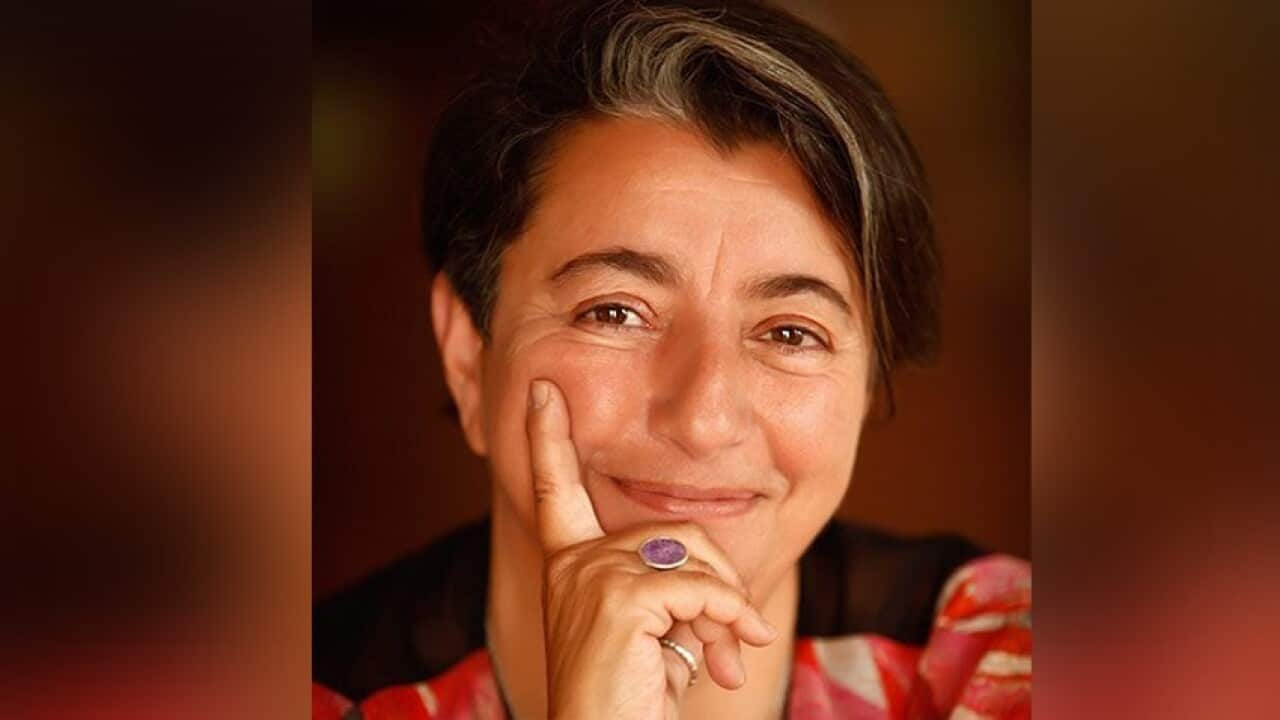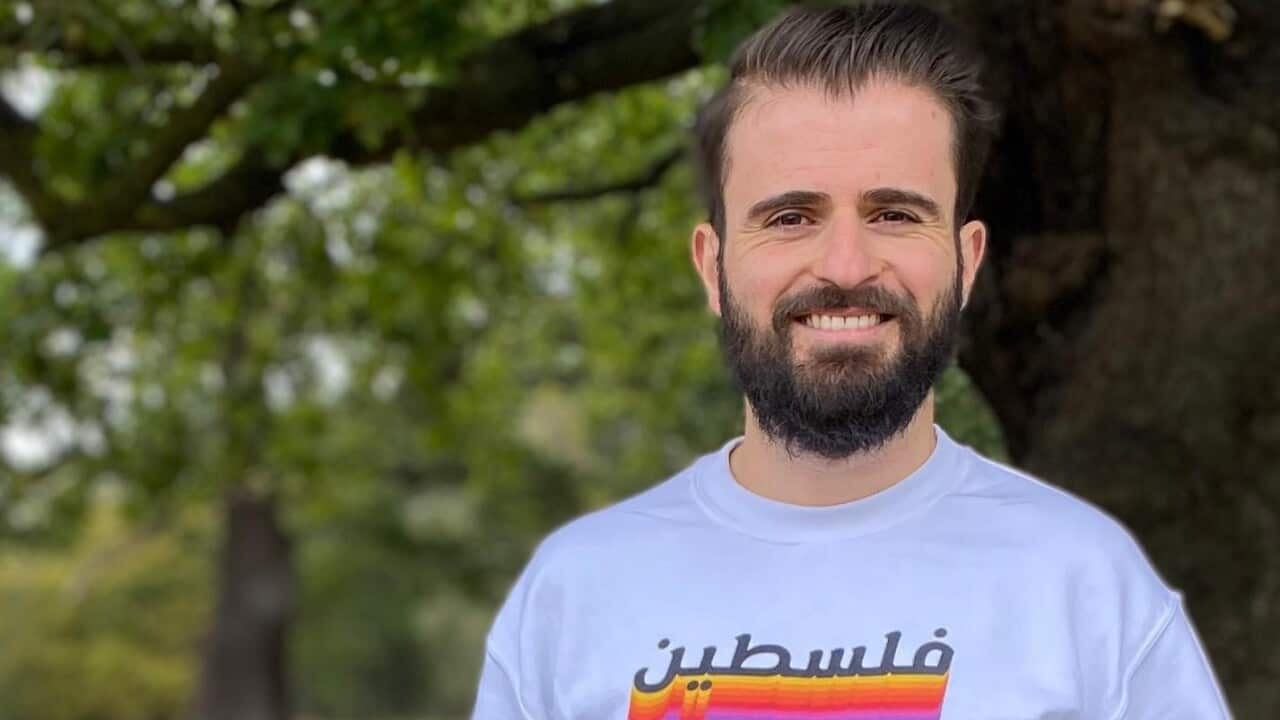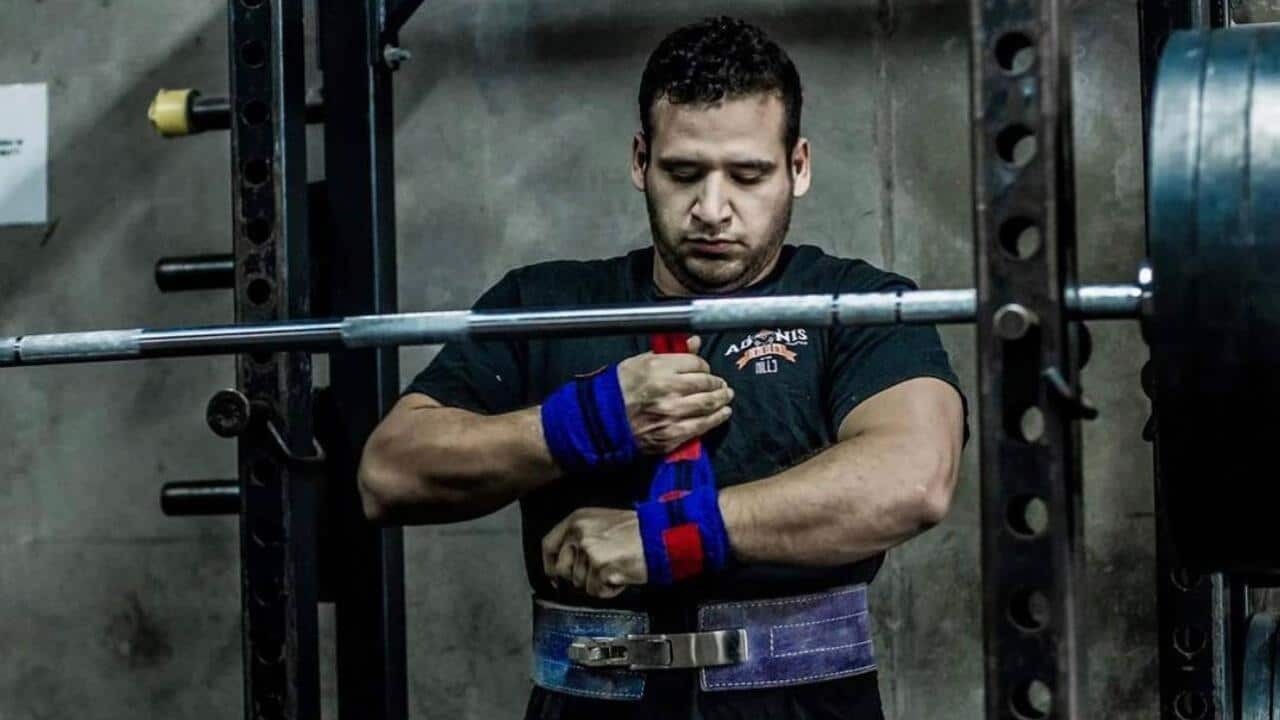"I was born stateless. My mother could not grant me the Lebanese nationality, and my father was stateless because he was a Palestinian refugee."
These are the words of Jeanine Hourani, a Melbourne-based researcher and refugee rights advocate.
"I did not know the value of this [citizenship] paper. This paper would allow me to live a respectable life and enable me to study and travel to all parts of the world.
"When I got older, I knew its value, and how it affects people's lives." Ms Hourani’s father was born in a refugee camp in Syria and carried travel documents for Palestinian refugees which enabled him to relocate to Bahrain.
Ms Hourani’s father was born in a refugee camp in Syria and carried travel documents for Palestinian refugees which enabled him to relocate to Bahrain.

Travel document for Palestinian refugees. Source: Jeanine Hourani
Her mother arrived in Bahrain, after fleeing Lebanon during its bloody civil war.
Just as her father and grandfather experienced, in Bahrain, Ms Hourani and her family were unable to properly settle because they didn’t belong to any state or hold documentation that would allow them to transition.
Leap of faith to Australia
Despite their almost impossible predicament, the family decided to take a leap of faith to relocate to Australia to seek asylum while Ms Hourani's mother was pregnant.
She explains that the catalyst for their leap was that her parents realised that statelessness would extend to the third generation of their family, and they decided that this “insulting legacy” of the most basic human rights had to stop.
"By virtue of their residence in Bahrain, the only way that would allow my father to meet the Australian embassy staff was to travel to Dubai or Saudi Arabia to conduct the interview.
“But these two countries did not allow my father to pass because he is a refugee.
"By chance, one of my mother’s acquaintances in Greece managed to help my father get a chance to cross. My father was then able to go and explain our story. Australia agreed to our asylum request."

Visa to Australia Source: Jeanine Hourani
Asylum at last
Ms Hourani has always described her family’s story of being granted asylum in Australia as mere chance or luck, compared to the more than five million Palestinians who are living stateless in various countries.
The family arrived in Australia in February 1997, when Ms Hourani was only three years old.
Her mother was a teacher of sociology, geography and history, while her father worked in financial services and insurance. She recalls that her parents experienced difficulties securing employment, and their financial situation was unstable during this period.
"I remember that on Saturday we used to go to the Palestinian demonstrations in Melbourne. On Sunday, I was going to learn Arabic.
“When I came back to school on Monday, I would hear my classmates talking about the recreational activities they did on the weekend, and I was hoping to do what they are doing."
However, she admits that attending demonstrations at a young age with her family helped the family integrate into Australia and contributed to the forming of a small community that they were key members of.
"I understood from a young age that we, the Palestinian children, were created within the confines of a cause. As a Palestinian, I cannot live a life separate from politics."
However, she says their stay in Australia only lasted four years due to the isolation they felt due to the lack of family support, and racism experienced by Ms Hourani’s father in the workplace.
After they acquired Australian citizenship in 2000, her father received a job offer in Bahrain and her family returned to the Gulf country. "Even though life in Australia was very difficult, I was sad to leave it. Yes, we were going to return to our family in Bahrain, but when we arrived, I felt alienated there and was shocked by my new surroundings.
"Even though life in Australia was very difficult, I was sad to leave it. Yes, we were going to return to our family in Bahrain, but when we arrived, I felt alienated there and was shocked by my new surroundings.

Jeanine Hourani with her family in Australia Source: Jeanine Hourani
"Everything was new to me, and even the presence of extended family members around me was something strange."
Returning to Bahrain meant Ms Hourani would once again face the challenges of migration and integration.
"My Arabic wasn’t strong enough, I did not know how to express my opinion. Even at the New International School, most of my classmates were from Britain and my Australian English accent to them was frowned upon.
"My father's family was also critical of my mixed accent of Lebanese, Syrian and Palestinian."
She said it was impossible to feel a sense of belonging to any place or identity.
"What was most strange to me was that I was not a Gulf citizen, and I was not a foreigner at the same time.
"I was Arab, but I am not a Gulf Arab, and a foreigner, but I am not a foreigner, I only hold Australian citizenship. I did not feel I belong to this or that." Generations of Palestinians over the past 70 years have experienced situations of hardship due to their status as refugees and living in exile, as a result of war and occupation.
Generations of Palestinians over the past 70 years have experienced situations of hardship due to their status as refugees and living in exile, as a result of war and occupation.

Jeanine Hourani with her family members. Source: Jeanine Hourani
After three years in Bahrain, the family decided to move to Abu Dhabi, where Ms Hourani joined the international school.
But this time, she decided to live her life in the country as an Australian, in a country that considers non-citizens, even if they are Arabs, foreigners if they do not hold local citizenship.
Australian citizenship gave her great privileges to move and live anywhere in the world, especially when the time came to finish high school and complete her university studies.
"I didn't think to stay in Abu Dhabi for a moment. I applied to go to university in Britain and Australia. I got approval from both countries. But I chose Australia because the university study costs were cheaper because I have Australian citizenship."
She returned to Australia alone to study at the University of Melbourne, when she was nearly 18 years old.
"I felt lonely and strange here. Everyone around me had been living in Australia for a long time or had been born in it.
"I was a stranger from a Gulf country, but not one of their citizens. My colleagues did not know much about the Arab countries.
"I had to explain my life story every time I met someone new, and I started getting bored of this. Especially since my story was so complicated."
She says as much as a migrant may like to introduce his culture to the wider community, at times they may feel that revealing their Arab identity may open doors of endless questions due to the stereotypes taken from the Arab culture in Australia.
"If we open the topic, I cannot stop answering the dozens of questions that were raining down on me.
"How are you a Muslim but you uncover your hair? You are Palestinian, but you were not born in Palestine and you do not hold its nationality? How are you Lebanese and Lebanon did not grant you its nationality or the right to enter it?
"I was tired. So, I started telling them a brief and clear story, so they would leave me alone."
She used to live in student housing on the university campus. "There were no Arabs or Muslims living in the housing with me. I had to conceal my identity in order to feel and be accepted."
"There were no Arabs or Muslims living in the housing with me. I had to conceal my identity in order to feel and be accepted."

Jeanine Hourani: Public Health | Research & Policy | Refugee Advocacy Source: Jeanine Hourani
"I concealed my Arab and Islamic identity and used to fast Ramadan without anyone around me knowing it. I did not tell them about my Palestinian identity because this was also a political affiliation.
"I was hiding the real me."
She was not ashamed of her Palestinian identity, but for years of her life, she had thought that talking about the Palestinian cause would not return Palestine to its people.
"Throughout my life, the situation in Palestine remained the same. We used to go to demonstrations and talk about the issue, but nothing changed. That is why I felt that what we do did not make a difference.
"But when I grew up, after the age of 21, I began to see that there are many oppressed people besides us as Palestinians. These people do not lose hope, they don’t give up.
"That is why I decided to go into politics again, and I started following the events again and going to demonstrations as well." Ms Hourani met an Indigenous classmate during her studies. They were united by a strong friendship, and it felt that the issues that both had experienced bonded them together.
Ms Hourani met an Indigenous classmate during her studies. They were united by a strong friendship, and it felt that the issues that both had experienced bonded them together.

Jeanine Hourani with a group of friends and advocates. Source: Jeanine Hourani
This classmate became one of her closest people and knows a lot about her true identity. One day, she told her why her family had migrated to Australia.
"I told her that I am a Muslim, and I feel overwhelmed and sad about what I see in the media coverage of Muslims. I told her why dad brought us to Australia and how we became Australians.
"She told me that it was the first time she had heard a story like this and the first time she had spoken to a refugee.
"She also told me, when we hear about asylum or refugees in Australia, we don't think of someone like you.
"Then I felt the importance of telling my story to help change the stereotype about refugees in Australia." After she finished her BA, her younger sister arrived in Australia to study at university as well. The two sisters lived in a house alone.
After she finished her BA, her younger sister arrived in Australia to study at university as well. The two sisters lived in a house alone.

Jeanine Hourani is an advocate, campaigner and researcher. She is currently the Director of Road to Refuge. Source: Jeanine Hourani
"I started to think that this period of my life is a new beginning, and I can be and do whatever I want. And my sister's presence in my life helped me, so she knew the real Jeanine and knew who my family was and how we grew up and raised.
I told myself then that I can stop pretending to be someone else because I was afraid that society would not accept me here, but I was no longer afraid of it.
Indeed, Ms Hourani is no longer afraid or ashamed to talk about her story with asylum, to reach everyone who tries to belittle the status of the Arab refugee and tarnish their image in Australia.
Not only that, she started working with diverse refugees, asylum seekers and stateless people to help them tell their stories of asylum in Australia, to change the stereotype taken about refugees in the country.
“I feel proud of my Arab identity.”
“When people ask me where I am from, I change my story according to the identity of the person asking me.
"If a Palestinian person asks me, I tell him I am Palestinian, and if he tells me Lebanese I tell him Lebanese, and if he tells me an Arab, I tell him I am half Palestinian and the other half Lebanese, and if I am outside Australia and someone asked me, to tell them I'm an Australian.
"However, above all, I am an Arab."
Jeanine Hourani is an advocate, campaigner and researcher. She is currently the Director of Road to Refuge. Jeanine works as a researcher and educator at Melbourne School of Population and Global Health where she specialises in the prevention of violence against refugee women. Jeanine has previously held roles at the Asylum Seeker Resource Centre, at a Public Policy Consulting firm, and with CARE International at Azraq Refugee Camp, Jordan.





